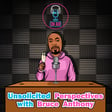
Unapologetically You: Lessons on Authenticity from Dr. Nicole Bradford
Authenticity, self-love, and overcoming adversity are at the heart of this episode with Dr. Nicole D. Bradford-dynamic speaker, educator, and author of "My Soul Is Not For Sale." Discover how Dr. Bradford broke free from family expectations, colorism, and the scars of domestic violence to become a first-generation PhD and founder of the empowering Maintain the Flame brand.
We dive deep into the pain of hiding your true self, the struggle with self-esteem in the face of colorism, and the challenge of outgrowing the labels society and family put on you. Dr. Bradford shares her journey from “oops baby” to authenticity architect, revealing how therapy, self-reflection, and courage helped her-and can help you-reclaim your worth and live life on your own terms.
If you’ve ever felt trapped by expectations, doubted your value, or struggled to love yourself, this conversation will inspire you to keep evolving and ignite your inner flame. Tune in for real talk, actionable advice, and stories that prove you can rewrite your story-no matter where you start. #Authenticity
#overcomingadversity #blackexcellence #SelfLoveJourney #breakthemold #unsolicitedperspectives
🔔 Hit that subscribe and notification button for weekly content that bridges the past to the future with passion and perspective. Thumbs up if we’re hitting the right notes! Let’s get the conversation rolling—drop a comment and let’s chat about today’s topics.
For the real deal, uncensored and all, swing by our Patreon at patreon.com/unsolicitedperspectives for exclusive episodes and more.
Thank you for tuning into Unsolicited Perspectives with Bruce Anthony. Let's continue the conversation in the comments and remember, stay engaged, stay informed, and always keep an open mind. See you in the next episode!
#podcast #mentalhealth #relationships #currentevents #popculture #fyp #trending #socialcommentary
Chapters:
00:00 Unleash Your Inner Flame: Breaking Society’s Grip 🔥✨
00:25 Welcome to Unsolicited Perspectives 🎙️🔥💥
00:51 Meet Dr. Nicole Bradford: The Authenticity Architect 🏗️💡
06:00 From “Oops Baby” to PhD: Dr. Nicole’s Origin Story 👶➡️🎓
09:36 Family Ties & Breaking the Mold: When Success Shakes Up Everything 👨👩👧👦🥇
12:22 Shades of Worth: Conquering Colorism & Self-Doubt 🎨🛡️
15:18 Silent Scars Revealed: Tackling Domestic Violence with Courage 🛡️❤️
21:25 Escaping the Conformity Trap: Stop Dimming Your Light 🕳️➡️💡
24:38 College Chaos: Parties, Boundaries, and Finding Purpose 🎓🚫🍻
27:18 Ignite Your Purpose: The Birth of ‘Maintain the Flame’ 🔥🚀
28:42 Behind the Pages: The Heart of “My Soul Is Not for Sale” ❤️📖
30:15 The Flush Method: Healing, Growth, and Letting Go 🌀🌱
31:58 “Therapy Isn’t Weakness” – Smashing Stigmas 🛋️💬
33:23 Juggling It All: Secrets to Balancing Life’s Many Roles 🤹🏾♀️⏳
35:05 Leading with Purpose: Lessons in Education & Empowerment 🏆📚
36:46 Parenting in 2025: Raising Resilient Kids in a Changing World 👶🏾🌎
40:33 Dream Bigger: Dr. Nicole’s Vision for Community Impact 🌍✨
42:45 Sparks That Stick: Key Takeaways to Fuel Your Journey ✨📌
49:57 Your Turn: Join the Movement & Keep the Flame Alive! 🚀🔥
Follow the Audio Podcast:
Apple Podcast: https://podcasts.apple.com/us/podcast/unsolicited-perspectives/id1653664166?mt=2&ls=1
Spotify: https://open.spotify.com/show/32BCYx7YltZYsW9gTe9dtd
www.unsolictedperspectives.com
Beat Provided By https://freebeats.io
Produced By White Hot
